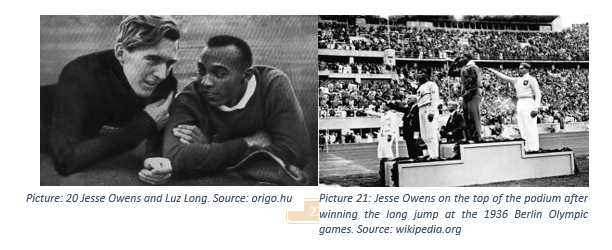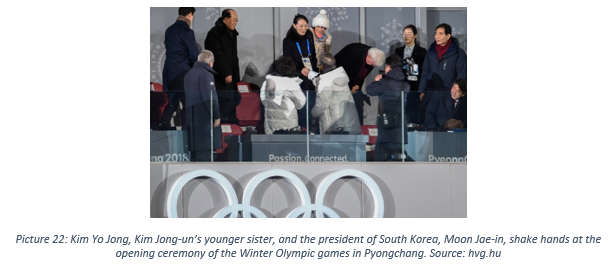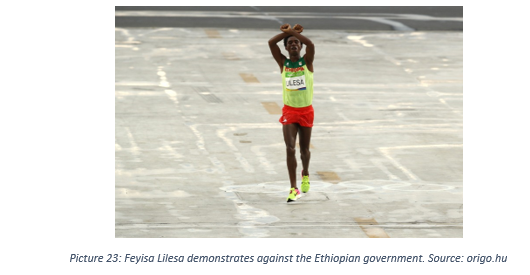9. Sports and Politics
9.1. When Sport Becomes the Terrain of Power Games
Sport as a social sub-system has undergone major changes as a result of the influence of political and economic processes. We must therefore include the interrelations of sports and politics in the scope of our observations.
The ethos of both the antique and modern Olympics claims that sport is capable of promoting people’s friendship, peaceful co-existence. Baron Coubertin started the modern Olympics with that idea. The historical processes, changes of political systems, radical ideologies, wars and cataclisms of the 20th century, however, undermined the baron’s excessive optimism in connection with the Olympic games. Politicial functionaries soon recognized the advantages offered by sport, especially global events, so various regimes began to use sport as a strategic means to justify their ideologies and to solve international conflicts (Onyestyák 2010). Sport is a trusty means of establishing and sustaining international relations, often promoting the creation of official connections between countries. We have, however, seen examples to the opposite as well (e. g. the terrorist attack carried out at the 1972 Munich Olympics). In the Eastern-European socialistic countries sport was used to achive certain foreign- and domestic political goals. Its functions were often the same as in the developing countries: to achieve objectives such as building the nation, improving its integration and defence, improving the health of the population and earning international recognition. These goals were expected to be attained primarily through competitive sport. Internationally competitive sportspeople were granted a diplomatic status, and they were supposed to represent the viability of the socialist system at the beginning, and its superiority later. Competitive sport became a susbstitute for the national identity suppressed in the name of socialist internationalism (Földesiné 1995).
It is possible to find examples to a similar attitude on the other side as well. By organizing the 1936 Olympic games in Berlin, Hitler intended to demonstrate the power, omnipotence and superiority of the German Empire and the Nazi ideology. Sportspeople were regarded as the idols of the Aryan race: they were supposed to be powerful, dynamic and undefeatable. The alleged superiority of the Aryan race was also indicated by the fact that they did not want to allow Jews to take a place in the audience. The commitment to the power was symbolized by the Nazi salute the audience gave to the Führer and the arriving sportspeople. Winners stepped upon the podium with the same Nazi salutation, as shown in the picture below. That is why the four gold medals of the legendary Jesse Owens were so painful for the Führer. One of the four medals was won in long jump before one of the most capable German sporstman, Luz Long.
The movie titled Race is the story of the noble competition and the life-long friendship of the two sportsmen.
The movie titled RACE (video).

Upon recognizing the economic and political advantages offered by sport, an increasing number of countries entered international competitive sport, although their motivation was not always the same. Some countries used it to improve their image, demonstrating the wellfare and wealth of their population. It happened in the case of both capitalistic and socialist states (e. g. the Soviet Union, Italy, Western Germany, whereas smaller countries (e. g. Finland) intended to show that they were able to organize international sports events independently and they have a lot of talented sportspeople. Some others became connected into international sports tourism through their natural treasures (e. g. Austria). For developing countries, investment in a popular branch of sport (e. g. football) proved to lucrative, as the talented sportspeople who were given a chance expanded the supply side of the market, and for many of them it was a point of breaking out of deprivation (Laki, Nyerges 2006).
During the cold war, sport became a means of politics, a source of political capital. The intrusion of politics into sports, especially the Olympic games, was evident during the cold war, primarily in the 1980s. The Americans boycotted the 1980 Moscow Olympic games, and the Soviet Union and its Eastern European satellite states (with the exceptions of Romania and Yugoslavia), in turn, boycotted the 1984 Olympic games in Los Angeles. The 1988 Olympic games in Seoul were organized in a similarly complicated situation, since the Korean peninsula is divided between two countries of opposing ideology that are formally even at war with each other: the communist North Korea and the capitalistic South Korea (Onyestyák 2010). The conflict between the two countries was renewed in November 2016. That is why it was an international sensation that Phenyan sent a 22-strong diplomatic delegation to the 2018 Winter Olympics in Pyongchang (South Korea). The delegation included. among others, Kim Jong Nam, official head of the North Korean state, and Kim Yo Jong, the younger sister of Kim Jong-un, who invited the Government of South Korea to an official visit. The détente experienced in the relationship of the two countries (improving diplomatic relations, joint marching in at the opening ceremony of the Olympics, joint women’s ice hockey team etc.) make the illusion that the Olympics have really become a catalyst of peace between countries, which has always been a major objective of the games. It is, however, evident that authoritarian regimes whose foreign diplomatic relations are not very extensive, have always used major international sports events to revive their political relationships.

There are legends in the world of sport when a sportsperson at an international event wishes to draw public attention to political injustice existing in their country. Such was the Marathon running, the last event at the 2016 Olympics in Rio de Janeiro, when one of the greatest runners of all times, Eliud Kipchoge won the gold medal, but the event did not become famous for that. The winner of the silver medal, Feyisa Lilesa of Ethiopian origin, crossed the finish line with his hands crossed, in protest against the brutal cruelty with which the Ethiopian government treats the Oromo tribe. Hundreds of the tribe’s members were slain, and thousands, including family members of Lilesa, were imprisoned. They also expressed their dissatisfaction with the cruelty of the oppressive system.

Control questions
Which global sports events fell ”victims” of politics?
Provide examples!
TASK: Watch the film titled Race, and show how Germany used the 1936 Olympics for the legitimisation of the Nazi ideology!